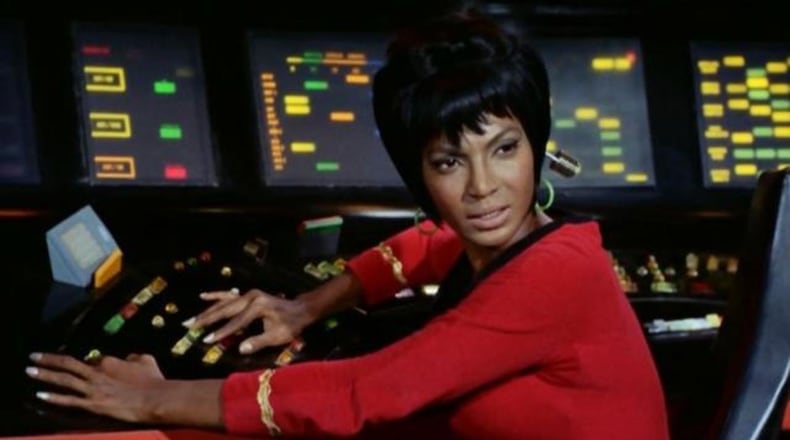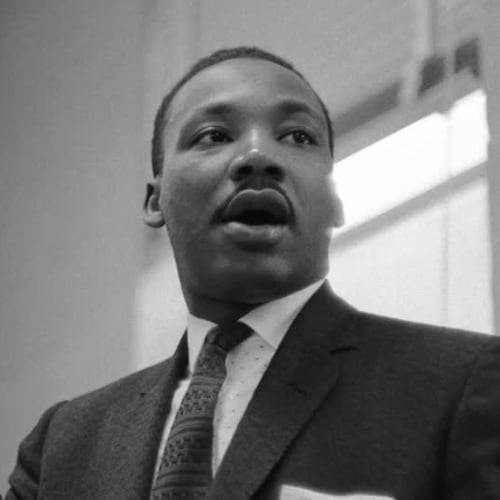This story was originally published in 2021. For our complete Black History Month coverage, click here.
The story goes like this:
It was 1967, and reviews for the first season of Star Trek were not great. Nichelle Nichols, who played Lt. Nyota Uhura, had bigger issues with the show. She found it demoralizing to see her lines cut and cut again. She had to deal with racist insults off set, as well as from executives who conspired to keep her from seeing her fan mail.
At the end of the first season, Nichols recounted in her autobiography, she told the show’s creator she was done.
But the next day, at an NAACP function, a fan greeted her: Martin Luther King Jr. He told her how important her role was and how he and his family watched Star Trek faithfully and adored her in particular — the only Black character.
Nichols thanked him, but said she planned to leave.
“You cannot and you must not,” she recalls him saying. “Don’t you realize how important your presence, your character is? ... Don’t you see? This is not a Black role, and this is not a female role. You have the first non stereotypical role on television, male or female. You have broken ground.
“... For the first time,” he continued, “the world sees us as we should be seen, as equals, as intelligent people — as we should be.”
Nichols stayed.
She stayed for the next two seasons of the series, lent her voice to an animated version and appeared in a half-dozen Star Trek movies. She had the first interracial kiss in American television. She recruited for NASA. Through her work, she influenced Mae Jemison — the first Black female astronaut.
Credit: Jonathan Phillips
Credit: Jonathan Phillips
By continuing on Star Trek, she had an impact on the lives of many others, including a number of metro Atlanta Black residents. Some credit Nichols’ presence on TV with giving them confidence to pursue their own interests.
Marilyn Teague, 72, said she watched Amos ‘n’ Andy as a child but didn’t know that she “wasn’t supposed to like it.” Seeing Nichols on TV was a revelation. Her character, a communications officer, spoke several languages. She was on the bridge of the Starship Enterprise. People listened to her.
“Her position there helped me get confidence in who I am,” said Teague, who lives in Doraville and became a sign language interpreter partly to emulate Lt. Uhura. “She was there at a time when we needed to see her.”
Tony Cade, 56, is the owner of Challenges Games and Comics and the director of the Atlanta Sci-Fi and Fantasy Expo. He first saw Nichols on screen in Star Trek reruns. It was refreshing to see a character who was not a criminal, a nanny or a maid. He said her presence reinforced to him that he could be a leader — she might not have had a lot of lines, at first, but she still commanded respect.
“She inspired a lot of people. She inspired me to do a lot of the things I do,” he said. “Nichelle opened the eyes of many people who opened the eyes of many more people.”
Eddie Hines, 47, said Nichols’ role was a stepping stone for the Star Trek franchise, too. A Black woman — Sonequa Martin-Green — plays Michael Burnham, the lead of the recent series, Star Trek: Discovery.
As important as it was for Black people to see themselves represented on screen, Hines said, it was just as important for white people to see Lt. Uhura as a fully developed character.
“To be on the bridge and not be the cleaning lady — Black people already wanted it,” the Smyrna resident said. “To get people who did not want it to accept it is a huge leap. ... She did it through grace. She made people enjoy her performances.”
Joseph Campbell, an East Point graphic artist, doesn’t think the show would have resonated the same way had Nichols exited, as she planned.
“I’m so glad she stuck it through,” he said. “Just seeing her was like, wow, that’s me.”
Without Nichols, Campbell said, it would have taken longer for Black people — and Black women in particular — to be normalized on screen.
“She showed young kids of color that you can do it,” Campbell said. “Nichelle Nichols was our Wonder Woman, our Captain Marvel.”
Dedren Snead was one of those kids. Snead, 45, distinctly recalls seeing Lt. Uhura on Nickelodeon — it was the first time he saw a Black woman animated.
It stuck with him.
Snead is writing a graphic novel, “Sorghum and Spear,” that’s due out in April. One character — Eshe the All-Mother — is based on Nichols, and uses her likeness. The Snellville resident described Nichols as an icon and credits her with sparking his interest in science fiction and fantasy, merely by being on the show. Through the graphic novel, he’s had a chance to interact with her and thank her for her work.
“If I didn’t see her, I wouldn’t have been interested in that stuff. A lot of us didn’t see ourselves invited to that conversation,” Snead said of science fiction. “The idea of seeing yourself in the future, that’s what I got from her. You’re making a direct statement: There’s a super smart Black woman in the future. We are there. We didn’t get wiped out. We didn’t get oppressed.”
About the Author
The Latest
Featured



